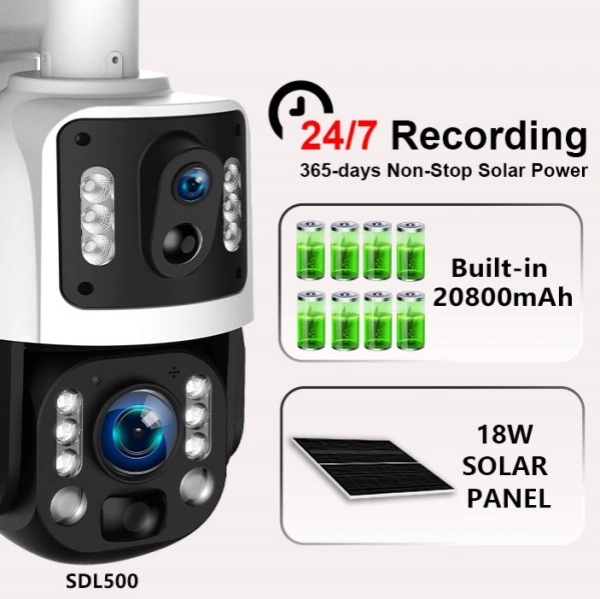Why Choose a Solar Security Camera Factory: Key Metrics for Assessing Production Capacity and Quality Control
In the rapidly growing security market, sourcing the right products is more than just a transaction; it’s a strategic decision that impacts your brand’s reputation, profitability, and customer satisfaction. As an engineer with over 13 years in designing and producing solar security cameras, I’ve seen countless wholesalers, brand owners, and installers struggle with inconsistent quality, delayed shipments, and a lack of technical support. The root cause often lies in their sourcing strategy: relying on trading companies instead of partnering directly with a dedicated solar security camera factory.
Working with a middleman shields you from the production floor, but it also disconnects you from the core processes that determine product reliability and performance. This article will pull back the curtain on what truly defines a capable manufacturing partner. We’ll move beyond surface-level specifications and delve into the critical metrics for assessing a factory’s production capacity and, most importantly, its quality control systems. Understanding these elements is key to securing a supply chain that fuels your growth, not hinders it.
Beyond the Spec Sheet: Assessing True Production Capacity
Production capacity isn’t just a number quoted in an email. It’s a dynamic capability rooted in infrastructure, process efficiency, and skilled labor. Many factories can claim to produce 50,000 units a month, but can they maintain quality at that scale? Can they handle your custom order without disrupting their entire production line? As a B2B buyer, you need to look for tangible evidence.
A key indicator is the factory’s investment in automation and specialized equipment. For instance, inquire about their Surface-Mount Technology (SMT) lines. SMT is the process of mounting electronic components directly onto the surface of a printed circuit board (PCB). A factory with its own well-maintained SMT lines has greater control over the quality and supply of the camera’s “brain.” This reduces reliance on third-party PCB assembly, minimizing potential points of failure and delays. At UBOXCAM, our in-house SMT lines are fundamental to our ability to deliver reliable and competitively priced wireless outdoor security cameras.
Furthermore, assess the assembly line organization. A mature factory operates with a clear, modular workflow. This includes dedicated stations for lens focusing, waterproofing tests, function testing, and aging tests. A disorganized assembly process is a red flag for inefficiency and inconsistent output. Ask for a virtual or physical tour to observe how components move from one station to the next. A smooth, well-documented process demonstrates a factory’s ability to scale production without sacrificing quality.
Quality Control Deep Dive: Key Indicators of a Reliable Factory
Quality Control (QC) is where a factory truly proves its worth. A robust QC system is not a single checkpoint at the end of the line; it’s a multi-stage philosophy embedded throughout the entire production process. For solar security cameras, this is especially critical due to their exposure to harsh outdoor environments and reliance on battery performance.
Here are the essential QC stages a top-tier solar security camera factory must have:
- Incoming Quality Control (IQC): This is the first line of defense. Before any component enters the assembly line, it must be tested. For us, this means rigorously testing battery cells for capacity and internal resistance, verifying solar panel output under standardized lighting, and inspecting camera sensors for dead pixels.
- In-Process Quality Control (IPQC): Inspectors monitor each stage of assembly. This includes checking solder joint quality on the PCB, ensuring seals are correctly applied for waterproofing, and verifying that camera modules are correctly calibrated.
- Battery Management System (BMS) Testing: The BMS is the unsung hero of any battery-powered device. It protects against overcharging, over-discharging, and short circuits. A dedicated factory will have specific equipment to cycle the batteries and test every function of the BMS. This single step prevents a huge number of field failures. You can learn more about this critical technology in our BMS deep-dive article.
- Aging Test: This is non-negotiable. Every finished camera should be powered on and run continuously for at least 24-48 hours in a controlled, high-temperature environment. This “burn-in” process weeds out cameras with faulty components that would otherwise fail within the first few weeks of use.
- Final Quality Control (FQC) and Outgoing Quality Control (OQC): Before packing, each unit undergoes a full functional test—checking Wi-Fi/4G connectivity, PTZ movement, night vision, and app pairing. A final random inspection of packaged goods (OQC) ensures the product, accessories, and packaging match the order specifications.
The difference between sourcing from a factory with this level of QC and a simple trader is stark. A trader may only perform a superficial FQC check, leaving you vulnerable to the underlying component and assembly issues.
| Attribute | Direct Factory Partner (e.g., UBOXCAM) | Trading Company |
|---|---|---|
| Quality Control | Multi-stage control (IQC, IPQC, Aging, FQC). Direct oversight of the entire process. | Limited to final product inspection. No control over component sourcing or assembly. |
| Customization | High flexibility. Can modify firmware, hardware, and branding (OEM/ODM). | Minimal to none. Limited to standard models and basic logo printing. |
| Cost & Pricing | Competitive factory-direct pricing. Transparent costs. | Higher costs due to added margins. Prices can fluctuate. |
| Technical Support | Direct access to engineers for troubleshooting and product development. | Support is filtered through a salesperson, leading to delays and miscommunication. |
| Supply Chain Stability | Clear visibility into production schedules and component inventory. | Opaque supply chain. May switch between different, lower-quality factories without notice. |
Common Production Pitfalls and How a Good Factory Avoids Them
As a B2B partner, your reputation is on the line with every unit you sell. Here are common failure points I’ve seen plague low-quality cameras and how a meticulous manufacturing process prevents them:
- Water Ingress: The number one killer of outdoor cameras. A reliable factory uses high-quality rubber seals, precision-molded casings, and performs 100% air-pressure or water-spray testing on every unit certified for outdoor use. Simply claiming an “IP66 rating” is not enough; it must be verified in production.
- Rapid Battery Drain: Often caused by poor power management in the firmware or low-grade battery cells. A factory with strong R&D capabilities optimizes firmware for low-power standby and uses A-grade battery cells tested via IQC. The BMS testing is also crucial here.
- Weak Wi-Fi/4G Signal: This can result from poor antenna design or improper internal placement. Experienced engineers design and test antenna performance extensively. During IPQC, workers ensure the antenna is positioned correctly, free from interference from other components. This is why our 4G solar cameras are trusted for remote locations.
- Inconsistent Night Vision: Issues like IR LED failure or foggy images are common. This is prevented by using high-quality IR LEDs and conducting aging tests where the night vision is active, exposing any potential heat-related failures.
By understanding these potential pitfalls, you can ask targeted questions during your vetting process to gauge a factory’s true commitment to quality.
Case Study: How a German Wholesaler Reduced Failure Rates by 60%
Problem: A large electronics wholesaler in Germany was experiencing an alarming 8% return rate on their white-label solar security cameras sourced from a trading company. The issues ranged from batteries dying prematurely to cameras failing after the first heavy rain, severely damaging their brand reputation and straining their support team.
Solution: They decided to partner directly with UBOXCAM. We didn’t just sell them a product; we collaborated. Our engineers analyzed their failure reports and identified the main culprits: an inadequate BMS and inconsistent waterproofing. We proposed a customized solution: a product based on our Siren/Flash Light Alarm Camera but with an upgraded BMS featuring enhanced deep-discharge protection and a dual-seal waterproofing process with a 100% IP-rating test on the assembly line.
Result: Within six months of switching their supply to UBOXCAM, the wholesaler’s return rate dropped from 8% to just under 3%. This 60% reduction not only saved them significant costs in reverse logistics and replacements but also helped rebuild customer trust. Furthermore, with direct factory pricing, their profit margin on each unit increased by 15%, proving that higher quality can also lead to better financial outcomes.
Your Factory Audit Checklist: 10 Questions to Ask a Potential Partner
When you’re ready to engage with a potential factory, go beyond the price list. Use this checklist to assess their capabilities and commitment to being a long-term partner. A good factory will welcome these questions.
- Do you have your own SMT production lines?
- Can you walk me through your complete Quality Control process, from IQC to OQC?
- What percentage of finished products undergo an aging test, and for how long?
- How do you test the battery capacity and BMS functionality?
- What specific tests do you perform to guarantee the IP rating (e.g., IP66) of your outdoor cameras?
- Can you share your monthly production capacity and your current utilization rate?
- What is your process for handling a custom (OEM/ODM) request?
- Who would be my point of contact for technical support, an engineer or a salesperson?
- What certifications do you hold (e.g., ISO9001, CE, FCC, RoHS)?
- Can you provide references from B2B clients in my region (e.g., USA, UK, Germany)?
The answers to these questions will provide a clear picture of a factory’s professionalism, transparency, and technical prowess. They separate the true manufacturing partners from the assemblers and traders.
Partnering for Long-Term Success
Choosing a solar security camera factory is one of the most critical decisions for your business. It’s not about finding the cheapest supplier; it’s about building a partnership with a manufacturer that has the production capacity to grow with you and the stringent quality control to protect your brand. A partner like UBOXCAM provides the foundation of reliability, customization, and engineering expertise that allows you to focus on what you do best: selling and growing your business.
If you’re tired of quality issues and supply chain uncertainties, it’s time to look behind the curtain. We invite you to discuss your project needs with our engineering team. Let us show you how a direct factory partnership can transform your business. Contact UBOXCAM today to get a quote or schedule a detailed consultation.

